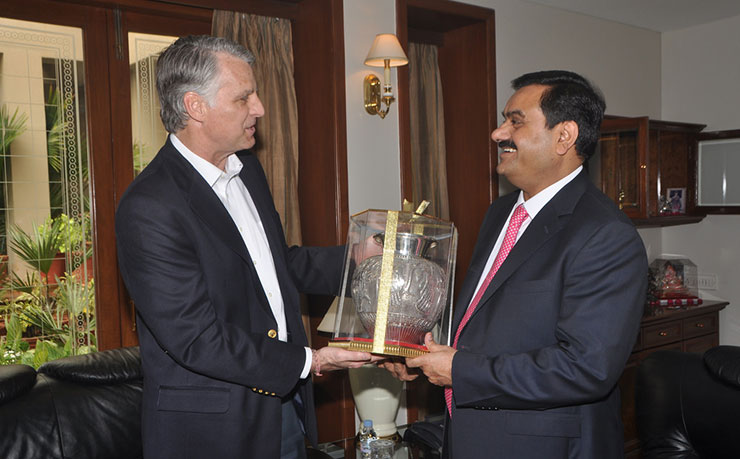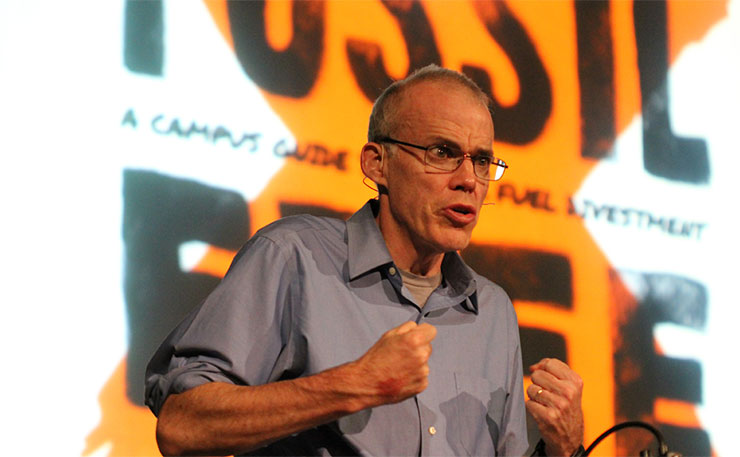As the ‘Great Australian’ prepares for its AGM this morning, legendary climate activist and founder and senior adviser for 350.org Bill McKibben pens a passionate plea for the mining giant to get ‘out of the abusive relationship’ it’s in with another not-so-great-Australian.
If BHP had a personal Facebook page, its relationship status would be… “it’s complicated”.
 BHP and the Minerals Council of Australia (MCA) have been in a long-term relationship for some time, but it’s pretty evident to anyone watching that BHP is now on the verge of a break up. And the MCA, bitter and frustrated with BHP’s growing distance – and more than a passing interest in climate change action – is sulking.
BHP and the Minerals Council of Australia (MCA) have been in a long-term relationship for some time, but it’s pretty evident to anyone watching that BHP is now on the verge of a break up. And the MCA, bitter and frustrated with BHP’s growing distance – and more than a passing interest in climate change action – is sulking.
Years ago when they first got together, BHP and the MCA wanted the same things – a glorious, shared future based on their mutual love of fossil fuels, especially coal. But the world has changed and now BHP and the MCA want different things.
The MCA is desperate to hang on to BHP, its biggest funder. Feeling threatened and jealous, the MCA is lashing out in the only way it knows how, taking out its frustration on another target – the environmental groups that it worries would woo BHP away to supporting climate change action.
BHP, embarrassed by the stance of its erstwhile partner, feels held back by the relationship. It’s only a matter of time before they split.
This cartoon version of the corporate relationships between the two may be oversimplified, but as BHP holds its Australian annual general meeting in Melbourne later today, it faces a shareholder resolution calling on it to quit the Minerals Council, and demands from the public to distance itself from the MCA’s attacks on civil society in Australia.

The timing is right for BHP to break from the Minerals Council pro-coal agenda and it should move swiftly. The company has already distanced itself from the lobby group’s attacks on Australian charities.
This witchhunt seeks to pressure the government to legislate how charities operate, rendering many of them ineffectual. As David Crosbie, chief executive of the Community Council for Australia said recently, this would mean groups would be “picking up the dead fish instead of advocating to stop the poisons going into the stream”.
There is currently a six-pronged attack on charities of all kinds in Australia, including efforts to take away tax deductions for donors, ban foreign donations to charities for aid and program work, restricting charitable status, carrying out harassing audits, the passage of heavy-handed anti-protest laws and attempting to discredit legitimate funding of advocacy organisations.
Last week (November 8) BHP said it would not support the move to restrict environmental groups’ advocacy.
But this isn’t enough.
While still the biggest funder of the Minerals Council, BHP must be held responsible for the lobby group’s actions. Together with Rio Tinto, BHP provides an estimated 60 per cent of the MCA’s funding. That’s the equivalent of being a major shareholder. While the leading Minerals Council member, BHP not only provides funds, but lends legitimacy to the group’s dangerous political agenda.

Because of lobbying efforts by the MCA, the Australian Federal Government is providing no climate change leadership and considering a $1bn loan to Adani to build a rail line to its enormous stranded asset – the Carmichael coal mine. This mine would be an unmitigated climate disaster, rob water from Queensland farmers and the land rights of Indigenous traditional owners.
 It would add 60,000 tonnes of greenhouse gas to the atmosphere each year, and see tonnes of coal shipped through the Great Barrier Reef.
It would add 60,000 tonnes of greenhouse gas to the atmosphere each year, and see tonnes of coal shipped through the Great Barrier Reef.
BHP’s silence makes it complicit. It must leave its toxic relationship with the Minerals Council before it’s too late.
While most of the rest of the world is desperately trying to move from fossil fuels to keep global warming under two degrees, the Minerals Council, like the Trump administration, is desperately trying to keep us hooked to 18th century technology.
The actions of the MCA stand in stark contrast with BHP’s stated commitment to social responsibility. In recent years BHP has been at pains to stress its climate credentials, and in the wake of the Samarco Dam disaster, to renew its commitment to the communities in which it operates.
Like any relationship break up, it’s likely to be messy, and BHP may have doubts over whether the time is right. But with the climate change clock ticking, deep down, BHP must know leaving the MCA is inevitable and putting it off will only delay the pain.
Time to be cruel to be kind BHP, and sever ties with the MCA before it’s too late for all of our futures.
Donate To New Matilda
New Matilda is a small, independent media outlet. We survive through reader contributions, and never losing a lawsuit. If you got something from this article, giving something back helps us to continue speaking truth to power. Every little bit counts.





